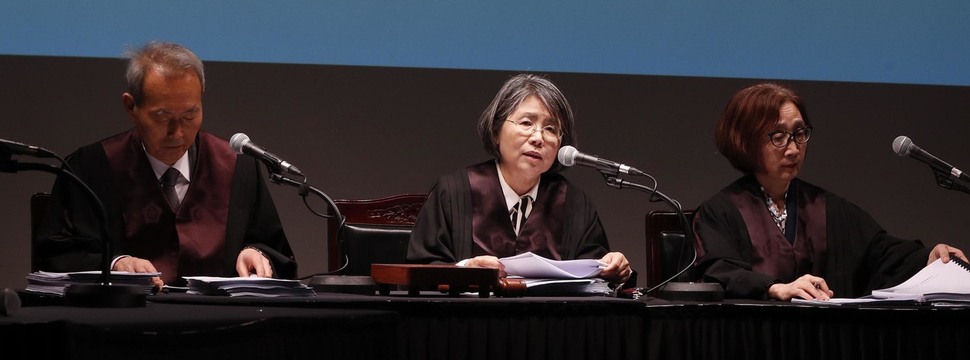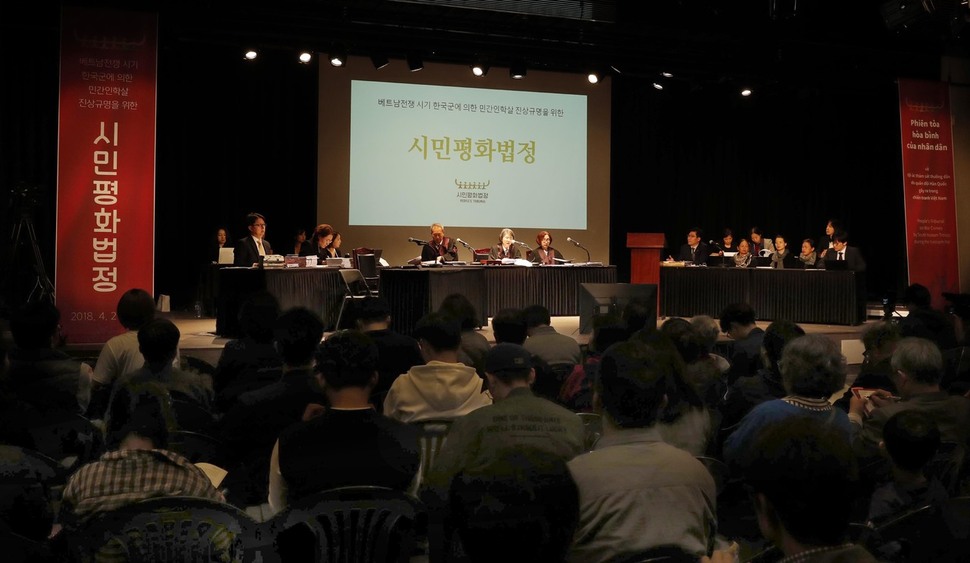 |
|
Kim Young-ran, former Supreme Court Justice, speaks during a citizens’ tribunal to discover the truth about civilian massacres by South Korean soldiers during the Vietnam War opens at the Oil Tank Culture Park in Seoul’s Mapo district on Apr. 22. Kim is flanked by attorney Lee Seok-tae (left) and Seoul National University law professor Yang Hyun-ah. (by Park Jong-shik, staff photographer)
|
Guilty ruling by a citizens’ tribunal will form the basis of a future legal suit
The story of civilian massacres by South Korean troops during the Vietnam War was first broken by Hankyoreh 21 in 1999. Statements from victims claiming deaths or injuries caused by South Korean soldiers were released, along with confidential US reports containing photographs. A fundraising campaign titled “We’re Sorry, Vietnam” took place in civil society. The state remained silent, but civil society remained active behind the scenes. In Nov. 2017, the group MINBYUN-Lawyers for a Democratic Society and the Korea-Vietnam Peace Foundation formed a preparatory committee for a citizens’ tribunal to examine the civilian massacres and conducted two on-site investigations. The results showed that over 400 civilians – including senior citizens, women, and children – were killed in Vietnam’s Quang Nam Province between January and February 1968 during the South Korean military’s “Monster Dragon I” operation. The preparatory committee now plans to use the mock trial ruling to file suit for state compensation. It is for this reason that the citizens’ tribunal was carried out as a civil case, in contrast with most citizens’ tribunals which have taken the form of criminal cases to determine the guilt or innocence of specific perpetrators. A 2000 citizens’ tribunal in Tokyo on the Japanese military comfort women issue was followed by an actual lawsuit. The statute of limitations is expected to be an obstacle if an official trial does take place. Civil suits must be filed within five years of the date of an illegal action. With 2018 marking the 50th anniversary of the Vietnam massacres, the time limit has elapsed. Indeed, victims of conscription during the Japanese occupation were hampered by the statute of limitations when they lost their case in Japanese court against Japanese companies implicated in war crimes. But legal experts said the statute of limitations may be disregarded in cases of crimes against humanity. Another key question is whether Vietnamese nationals will be recognized as having the right to demand state compensation from South Korea. The principle of mutual guarantees in the State Compensation Act states that if South Korean citizens are to be able to file suit for state compensation overseas, foreign nationals must also be able to exercise state compensation rights in South Korea; it will now need to be seen whether this principle can be applied between South Korea and Vietnam. The preparatory committee plans to pursue faster progress in a government investigation into the massacres and enactment of a special law preventing the statute of limitations from being invoked.
 |
|
The citizens’ tribunal to discover the truth about civilian massacres by South Korean soldiers during the Vietnam War opens at the Oil Tank Culture Park in Seoul’s Mapo district on Apr. 22. (by Park Jong-shik, staff photographer)
|







